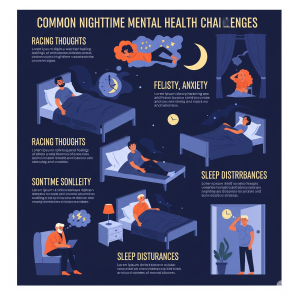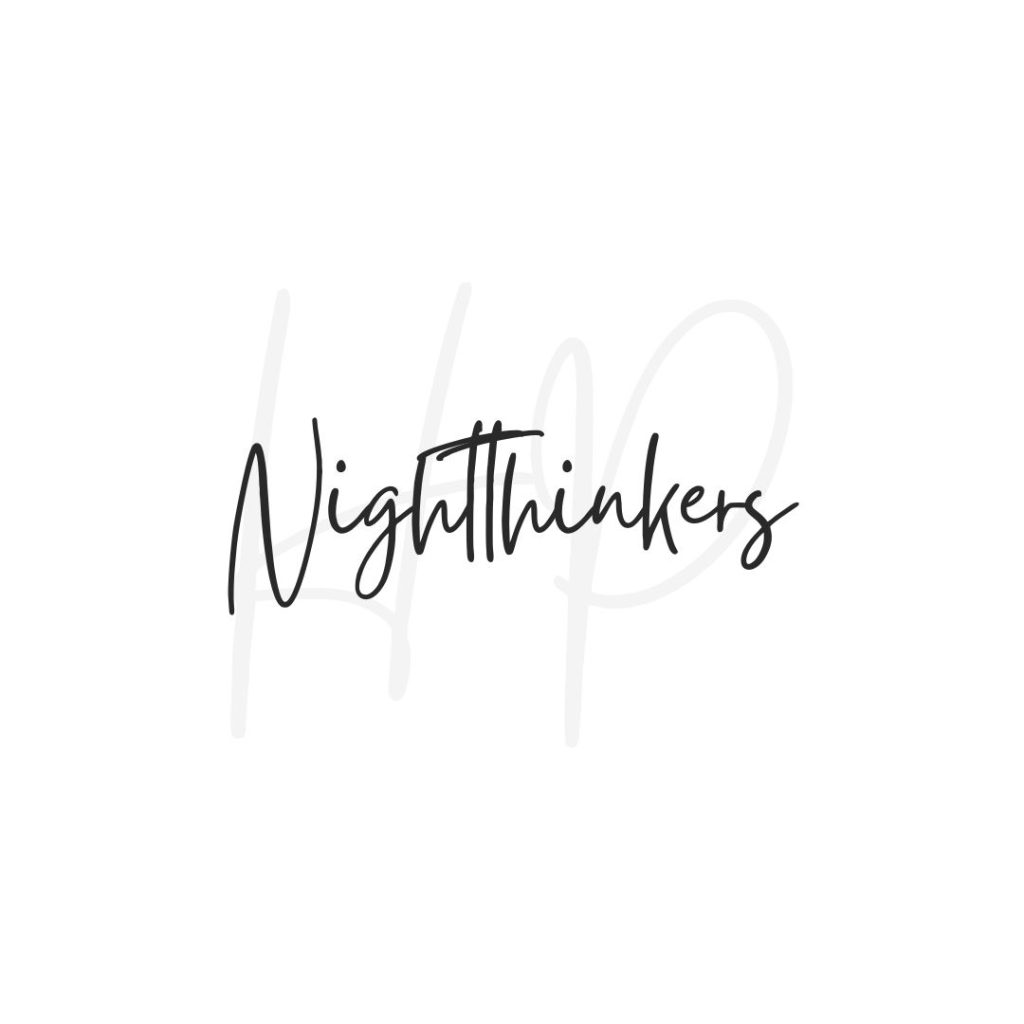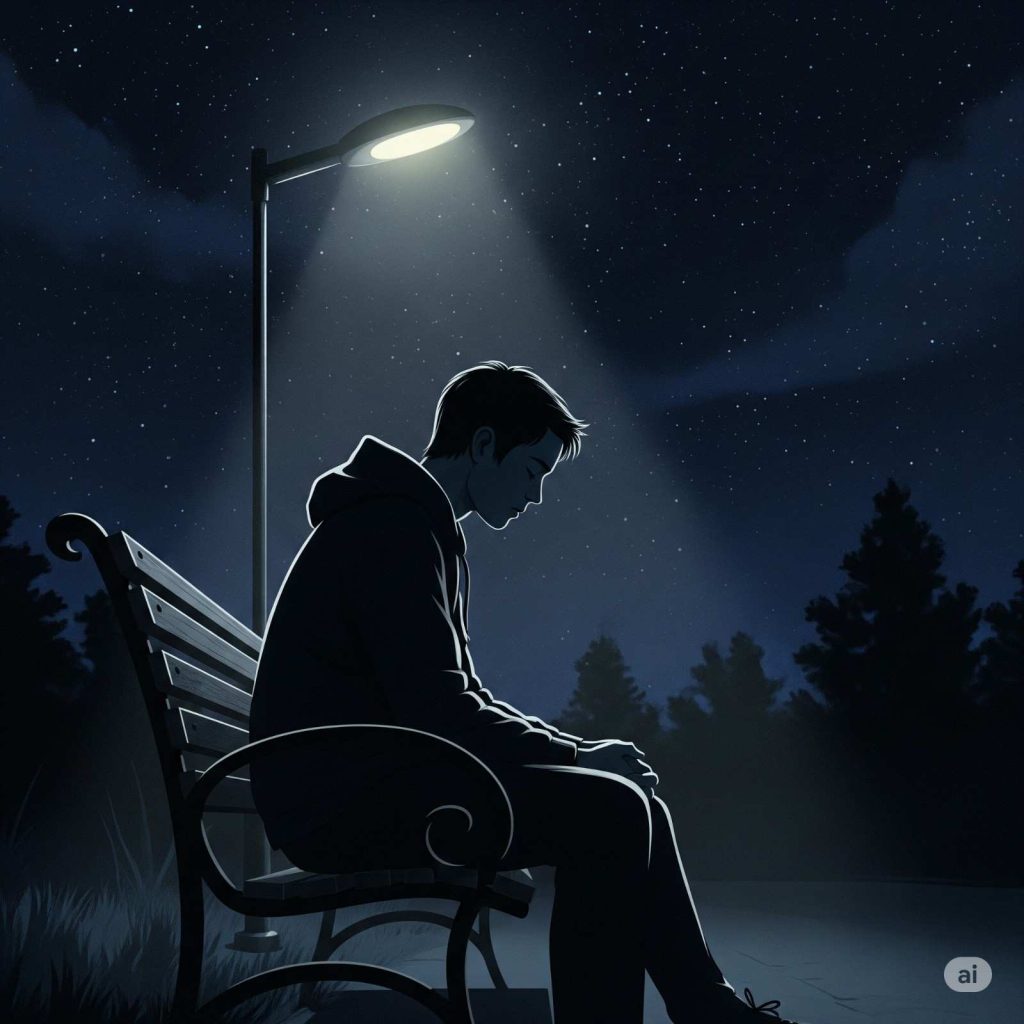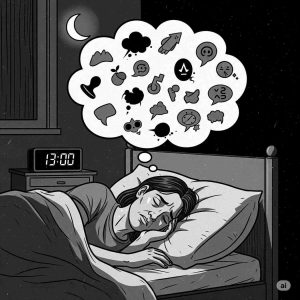🌙 Nighttime mental health Understanding the Silent Struggle After Sundown
As the sun sets and the world grows quiet, many people finally find a moment to be alone with their thoughts. For some, this peace is restorative; for others, it’s the beginning of a nightly battle with their own mind. Nighttime mental health is an often overlooked but deeply important aspect of overall well-being.
🕯️ Why Nighttime is Crucial for Mental Health | Nighttime mental health
When distractions fade, our inner voices become louder. Thoughts we’ve buried during the busy daytime rise to the surface at night.
Key Contributors to Nighttime Mental Struggles| Nighttime mental health
- Lack of distractions: No meetings, calls, or conversations to keep the mind occupied
- Sleep issues: Insomnia, racing thoughts, or poor sleep hygiene can worsen mental health.
- Emotional carryover: The emotional residue from the day builds up by night.
- Digital fatigue: Late-night scrolling or media exposure can trigger anxiety and depression.
🌘 Common Nighttime Mental Health Challenges | Nighttime mental health
1. Overthinking and Rumination
When we lie in bed, thoughts can spiral—past regrets, future anxieties, social interactions, or self-worth. This cycle of rumination can lead to restlessness and self-criticism.
2. Night Anxiety
Anxiety tends to heighten at night. The quiet can make worries feel louder, and physical symptoms like racing heart, restlessness, or chest tightness may keep you from sleeping.
3. Depression and Loneliness
Night can magnify feelings of loneliness and hopelessness. People dealing with depression may feel more isolated or emotionally numb in the late hours.
4. Sleep Disorders
Mental health and sleep are closely linked.

🕊️ How to Support Your Mental Health at Night | Nighttime mental health
The key to better nighttime mental health is to build calm, intentional routines and create emotional safety during the late hours.
🛌 1. Create a Nighttime Routine
Include calming rituals like:
- Reading a book
- Gentle stretching or yoga
- Herbal tea
- Listening to soothing music or white noise
🧠 2. Practice Mindfulness and Journaling | Nighttime mental health
Spending 5–10 minutes writing down your thoughts can offload mental clutter. Mindfulness meditation or breathing exercises can help anchor your thoughts to the present.
📴 3. Limit Screen Time
Exposure to screens—especially social media—before bed can overstimulate the brain. Set a “digital sunset” an hour before bedtime to help your brain power down.
💬 4. Talk to Someone
If nighttime mental health struggles become overwhelming, talk to a friend, therapist, or counselor. Sometimes sharing your thoughts aloud can relieve their emotional weight.
💡 5. Use Gentle Affirmations
Positive self-talk can counter negative thought spirals. Try repeating calming affirmations like:
- “I am safe in this moment.”
- “My mind can rest now.”
- “I’ve done my best today. Tomorrow is a new start.”
🌌 When to Seek Help
While occasional nighttime anxiety or sadness is normal, persistent or intense symptoms may indicate a deeper issue such as:
- Generalized anxiety disorder
- Depression
- PTSD
- Sleep disorders (like insomnia or sleep apnea)
If you experience regular sleeplessness, panic attacks, hopeless thoughts, or emotional numbness, consult a mental health professional. You’re not alone—and help is available.
Why Nighttime Is Emotionally Powerful | Nighttime mental health
1.1 The Mind Without Distractions
During the day, our minds are occupied—commutes, meetings, social interactions, and screen time form a protective noise around our emotions. But at night, the distractions fall away, and we are left with unfiltered thoughts.
Night invites emotional honesty. It’s when people confront the thoughts they’ve been avoiding: worries about the future, unresolved conflicts, past regrets, self-doubt, or existential questions.
1.2 The Role of Circadian Rhythms
Our biological clock regulates not only sleep but also hormone levels, mood, and cognition. Cortisol (the stress hormone) naturally lowers at night, while melatonin rises to promote sleep. But if your mental health is suffering, this rhythm is disrupted—leading to increased vulnerability to sadness, anxiety, or even panic.
Chapter 2: Common Nighttime Mental Health Struggles | Nighttime mental health
2.1 Overthinking and Intrusive Thoughts
Overthinking intensifies in silence. Without the sensory input of the day, the mind fills the space with memories, scenarios, what-ifs, and self-critique.
Symptoms:
- Replaying past conversations or mistakes
- Imagining worst-case scenarios
- Worrying excessively about the future
- Fear of failure or loss
These thoughts often feel louder and more real at night, and they delay or prevent restful sleep.
2.2 Nighttime Anxiety and Panic
Nighttime anxiety is more than worrying—it’s a visceral emotional response.Panic attacks can be more intense at night due to the stillness and lack of support nearby.
Causes:
- Stress carried from the day
- Health anxiety (fear something is wrong physically)
- Fear of the dark or silence
- Uncertainty about tomorrow
2.3 Depression and Loneliness in the Dark
Depression often deepens at night. The absence of human connection, meaningful activity, or structure allows negative emotions to settle in.
Loneliness at night is a powerful trigger, particularly for people who live alone, are in grief, or have experienced relationship loss. Feelings of worthlessness or emptiness often intensify in the absence of light.
Chapter 3: The Connection Between Sleep and Mental Health | Nighttime mental health
3.1 The Vicious Cycle
People with anxiety, depression, or PTSD are more likely to have disrupted sleep, which in turn worsens those same conditions. This feedback loop can become chronic if not addressed.
3.2 Nightmares and Trauma
For those with unresolved trauma, the night may bring nightmares or flashbacks. Sleep becomes unsafe, leading people to avoid it, creating further sleep deprivation and emotional exhaustion.
Chapter 4: Tools for Healing at Night | Nighttime mental health
4.1 Building a Grounding Bedtime Routine
A consistent and gentle nighttime routine is one of the most powerful tools for protecting nighttime mental health.
Components of a healthy nighttime routine:
- Dim lighting: Use soft lights or candles.
- Warm beverage: Herbal teas like chamomile or valerian root.
- Low-stimulus activity: Reading, drawing, gentle stretching.
- Soothing audio: Nature sounds, soft music, sleep podcasts.
This creates a psychological cue that it’s time to wind down, not worry.
4.2 Journaling: Mental Detox on Paper
Prompts:
- What’s one thing I’m grateful for today?
- What’s something I did well today?
- What’s worrying me right now—and what can I do about it tomorrow?
- If my mind had a voice, what would it say?
4.3 Mindfulness and Breathing Exercises
They help break the loop of rumination.
Try:
- Gratitude meditation: Focus on three positive moments from the day.
4.4 Limiting Stimulants and Disruptors
What you consume in the evening matters:
- Avoid caffeine or nicotine after 5 PM.
- Limit alcohol—it may sedate you, but it disrupts REM sleep.
- Don’t eat large meals too close to bedtime.
- Avoid emotionally triggering news or media.
Chapter 5: Nighttime Mental Health and Technology | Nighttime mental health
5.1 Blue Light and Sleep Disruption
Blue light from phones and computers suppresses melatonin. Even brief screen exposure can delay sleep by 30–90 minutes.
5.2 Social Media Comparison
Scrolling through idealized lives before bed is a recipe for insecurity and sadness. At night, our emotional resilience is lower, making us more susceptible to negative comparisons and self-doubt.
Replace nighttime scrolling with a digital detox—or use apps like Insight Timer, Calm, or Headspace for mindful unwinding.
Chapter 6: When the Darkness Becomes Overwhelming | Nighttime mental health
6.1 Warning Signs You Shouldn’t Ignore
It’s time to seek professional help if:
- You regularly dread going to bed due to thoughts or feelings.
- You experience frequent panic attacks or nightmares.
- You feel persistently hopeless, especially at night.
- You’ve considered self-harm or suicide.
6.2 Therapy and Nighttime Mental Health
Therapists can help you identify root causes of nighttime distress—childhood trauma, relationship issues, unresolved grief, anxiety disorders—and work through them safely.
Cognitive Behavioral Therapy for Insomnia (CBT-I) is a structured approach that addresses the thoughts and behaviors that interfere with sleep and mental calm.
Night doesn’t have to be frightening. With awareness and support, it can become a time for emotional restoration, creativity, and gentle introspection.
7.1 Rituals of Reflection
Use the night for:
- Creative expression (writing, painting, composing)
- Spiritual practices (prayer, moon gazing, affirmations)
- Emotional healing (forgiveness letters, inner child work)
7.2 Affirmations for the Night
Repeat these phrases aloud or write them down:
- “I release today. I welcome rest.”
- “My thoughts are not facts—they are just thoughts.”
- “I allow myself to be at peace.”
- “Even in darkness, I am safe.”
- “I am safe in this moment.”
- “My mind can rest now.”
- “I’ve done my best today. Tomorrow is a new start.”
🌌 When to Seek Help | Nighttime mental health
While occasional nighttime anxiety or sadness is normal, persistent or intense symptoms may indicate a deeper issue such as:
- Generalized anxiety disorder
- Depression
- PTSD
- Sleep disorders (like insomnia or sleep apnea)
Cultural Perspectives on the Night and Mental Health
8.1 Night in Philosophy and Religion
Across traditions and cultures, night has been viewed as a powerful metaphor:
- In Hinduism, the night (Ratri) is personified as a goddess who protects against the chaos of darkness.
- In Christianity, the night represents trials and spiritual testing—but also the promise of divine presence.
- In Sufism, nighttime is considered the best time for dhikr (remembrance of God), when the soul is most open.
- In East Asian thought, yin energy (dark, passive, inward) complements yang. Balance is necessary for peace.
These perspectives remind us that the night is not an enemy—it is part of life’s natural rhythm.
8.2 Modern Cultural Challenges
Today’s world has blurred the lines between day and night:
- 24/7 connectivity keeps our minds stimulated.
- Social expectations pressure us to be productive at all hours
- Urban lighting removes natural darkness, disrupting our circadian cycles.
The consequence? A generation struggling with “sleep guilt”, insomnia, and late-night mental distress without the emotional tools to cope.
Chapter 9: Artistic and Creative Expression as a Nighttime Remedy | Nighttime mental health
Night is a fertile space for creativity. Many great artists, poets, and thinkers worked at night:
- Franz Kafka wrote late into the night, exploring existential themes.
- Emily Dickinson penned poetry in solitude, often at twilight.
- Haruki Murakami describes his late-night writing as a portal into an “alternate world.”
9.1 How Creativity Supports Mental Health
- Helps externalize difficult emotions
- Provides a sense of purpose and mastery
- Distracts from intrusive thoughts
- Builds a bridge between emotion and action
9.2 Creative Night Rituals to Try
- Write “stream of consciousness” entries—free-flowing thoughts before bed
- Paint your emotions using abstract colors
- Record a voice journal instead of writing
- Compose “moon letters”—letters to your future self, or to someone who won’t read them
Let creativity become your catharsis. You don’t need to be good at art—just honest.
Chapter 10: Real Stories, Real Healing | Nighttime mental health
Hearing from others helps normalize our experiences. Here are a few composite stories based on real patterns seen in nighttime mental health journeys:
10.1 Mira’s Midnight Grief
Mira, 29, began experiencing intense sadness at night after losing her father. During the day, she functioned fine—but at night, waves of grief would crash over her. She started journaling every night before bed, writing “letters to Dad.” Over time, this ritual helped her express her sorrow and find healing.
Insight: Night allows repressed grief to emerge. Creating space for it, rather than suppressing it, promotes recovery.

-
10.2 Adam’s Battle with Nighttime Anxiety
Adam, 22, dealt with racing thoughts and chest tightness every night before sleep. He feared he was dying. With therapy, he learned to practice 4-7-8 breathing and kept a worry notebook beside his bed. When panic struck, he would write out his fear, remind himself of the facts, and breathe.
Insight: Grounding techniques and cognitive reframing can diffuse nighttime anxiety over time.
10.3 Priya’s Struggle with Sleep Paralysis
Priya experienced terrifying episodes of sleep paralysis—often seeing shadow figures in her room. She discovered these were linked to stress and inconsistent sleep cycles. She began meditating before bed and used soft light instead of pitch-black darkness. Gradually, the episodes faded.
Insight: Understanding the science behind nighttime distress empowers you to regain control.
Chapter 11: Building a Nighttime Mental Health Toolkit | Nighttime mental health
Here’s a consolidated list of practices and tools you can use to manage your mind after dark:
✍️ Writing Tools
- Thought log
- Gratitude journal
- Emotional inventory (rate your mood before sleep)
📱 Apps and Tech
- Insight Timer (meditations and music)
- CBT-i Coach (insomnia-specific cognitive therapy)
- Noisli (ambient sound for focus or sleep)
- Loóna (interactive bedtime stories)
📚 Reading Recommendations
- Why We Sleep by Matthew Walker
- The Sleep Solution by Dr. Chris Winte
- Tiny Beautiful Things by Cheryl Strayed (for emotional comfort)
🛌 Physical Supports
- Weighted blanket
- Blackout curtains
- Lavender essential oil
- Herbal teas (lemon balm, chamomile, valerian)
Your nighttime toolkit should match your unique emotional rhythm. Experiment and refine until you find what truly soothes your soul.
Chapter 12: Building a Community of Night Thinkers
Loneliness at night is universal. What if we created spaces where people could feel seen, heard, and supported after dark?
12.1 Community Ideas
- NightThinkers Chatrooms: Virtual, safe, moderated spaces to connect with others struggling at night.
- Live Meditation Nights: Group meditations streamed weekly.
- “Letters to the Night” Project: Anonymous submissions published to comfort readers.
12.2 How to Reach Out
- Want to chat?”
- Join a support forum or subreddit like r/Insomnia, r/Anxietyhelp, or r/LateNightThoughts.
- Use a helpline or mental health support chat if feelings become overwhelming.
Chapter 13: Motivational Nighttime Messages for the Soul
💬 Quotes for Comfort
“ “You don’t have to control your thoughts. “Uncertain. Alone. Cratered by imperfections.” – Tahereh Mafi
🌠 Affirmations to Whisper to Yourself
- “I forgive myself for not being perfect.”
- “I give myself permission to rest.”
- “I am worthy of peace, even in the dark.”
Repeat these as a gentle lullaby for the mind.
-
Midnight Loneliness: Understanding and Easing Emotional Isolation After Dark
🌙 Introduction
Loneliness has a strange habit of arriving just as the world gets quiet. During the day, we’re distracted—by work, by errands, by noise. But at night, the distractions fall away, and silence magnifies every emotion we’ve tucked away. Suddenly, we feel exposed, vulnerable, and alone.
Midnight loneliness is more than an emotional dip. It’s a psychological and physiological experience that affects millions. Whether you’re lying in bed scrolling through old messages or staring at the ceiling, wondering if anyone truly sees you—this article is for you.
Let’s explore what causes nighttime loneliness, how it affects the mind, and what you can do to ease the ache.
🕯️ Chapter 1: Why Loneliness Feels Stronger at Night
1.1 The Distraction Deficit
During daylight hours, you’re surrounded by movement, people, sound, and responsibility. These external forces keep your internal emotions at bay. But as night falls:
- Social interactions reduce.
- Work tasks pause.
- Digital conversations slow down.
The mind, left unchecked, begins to amplify dormant emotions—regrets, longing, and a craving for connection.
1.2 The Brain’s Emotional Reset
This means:
- You may recall past relationships.
- You may feel more nostalgic.
- Emotional pain seems sharper due to reduced serotonin levels at night.
It’s not “just in your head”—it’s literally how your brain functions after dark.
🧠 Chapter 2: Psychological Effects of Midnight Loneliness
Loneliness at night doesn’t just feel painful—it can deeply affect mental health if left unaddressed.
2.1 Emotional Spirals
What starts as mild isolation can turn into:
- Anxiety (“Why does no one care about me?”)
- Hopelessness (“I’ll always feel this way.”)
- Overthinking past events (“Maybe it was all my fault.”)
These thoughts grow louder in the quiet hours when you lack social buffering.
2.2 Sleep Disruption
The combination of sadness and ruminative thinking often leads to:
- Difficulty falling asleep
- Restless dreams
- Waking up in the middle of the night
Poor sleep worsens mental health, creating a loop of loneliness → insomnia → irritability → deeper loneliness.
🤝 Chapter 3: The Truth About Connection
3.1 Digital Presence, Emotional Absence
We live in the most connected era in history, yet more people report feeling isolated than ever. Why?
- Social media encourages performance over authenticity.
- Online interactions often lack emotional intimacy.
- Comparing lives on Instagram or WhatsApp can worsen feelings of inadequacy.
The result? Superficial connection that doesn’t meet emotional needs—especially at night when vulnerability rises.
💡 Chapter 4: Practical Strategies to Ease Nighttime Loneliness
Night doesn’t have to be a trigger for sadness. With the right approach, it can become a space for healing and growth.
4.1 Build a Nighttime Ritual That Includes Emotional Care
Create a routine that soothes and supports you emotionally. Try this sequence:
- Disconnect from screens an hour before bed.
- Light a candle or soft lamp—avoid harsh lighting.
- Play gentle music or ambient sounds.
- Journal about your feelings, using prompts like:
- “What am I feeling right now?”
- “What do I need emotionally?”
- Use a grounding technique, like holding a warm cup or deep breathing.
These steps help you transition into the night with intention, rather than drifting into distress.
4.2 Connect Authentically—Even Briefly
If you’re feeling alone, reach out:
- Text a close friend honestly: “Hey, I’m feeling kind of low tonight.”
- Leave a voice note.
- Join a moderated support forum or nighttime chat group (like r/lonely, r/NightOwls).
4.3 Practice Self-Companionship
Learn to enjoy your own company at night:
- Cook a small meal or treat for yourself.
- Write yourself a letter.
- Dance to your favorite playlist in dim light.
- Talk to yourself aloud: “I’m here for you. I’m safe. I’m loved.”
🌌 Chapter 5: Reframing Loneliness as Solitude
There’s a difference between loneliness (painful isolation) and solitude (peaceful aloneness).
5.1 The Power of Solitude
Some of the greatest ideas, art, and healing have come from people who embraced the quiet:
- Rumi wrote, “Don’t feel lonely. The entire universe is inside you.”
- Night poets and mystics often found clarity in the dark.
- Nature itself renews in silence and darkness.
What if you viewed your midnight moment not as a prison, but as a temple?
5.2 Solitude Practices
- Read a comforting book (fiction or spiritual).
- Light incense or sage and reflect silently.
- Speak a mantra: “This moment is enough. I am enough.”
- Meditate on moonlight or starlight.
🧘 Chapter 6: Emotional First Aid for the Lonely Night
Here’s a quick emotional rescue toolkit for when loneliness overwhelms you:
📓 Write a “Loneliness Letter”
Write about what you’re feeling and what you wish someone would say to you. Then write that message to yourself.
🎧 Listen to Healing Audio
Use apps like:
- Insight Timer (soothing meditations)
- Sleepy or Calm (bedtime stories)
- YouTube channels like Jason Stephenson for guided visualizations
💬 Create a “Night Connection List”
A short list of people you can safely message when needed. Keep it beside your bed.
🧸 Comfort Objects
Keep a warm blanket, soft pillow, or a scent you love nearby. Physical comfort often soothes emotional pain.
📖 Chapter 7: A Final Nighttime Reflection
Let’s pause for a final moment of truth:
You are not the only one feeling this way tonight.
All around the world, others are lying in bed:
- Missing someone who left
- Wondering if they’re enough
- Hoping for connection
- Trying to fall asleep without tears







